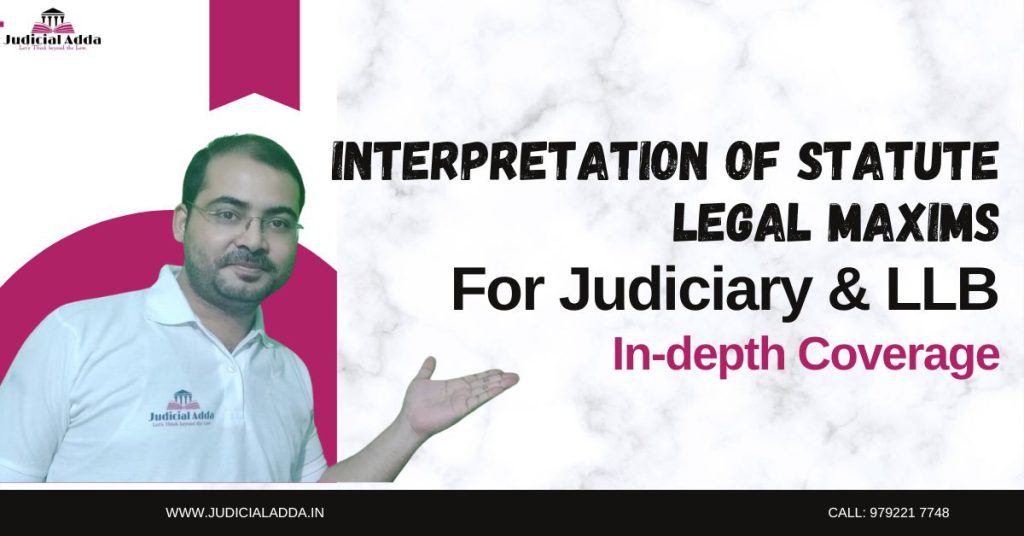
Understanding the Interpretation of Statutes: A Crucial Skill for Judiciary Aspirants
A judiciary aspirant must possess the ability to interpret statutes. It is imperative that future judges possess the ability to comprehend, analyze, and apply legislative texts. Those who are preparing for the PCS J Exam should be particularly concerned with this, as their success can be substantially influenced by their proficiency in legal interpretation.
The Role of Legal Maxims in Statutory Interpretation
Legal maxims are concise, universally recognized legal principles or propositions. They are essential in the process of statutory interpretation, as they offer fundamental guidelines that facilitate the comprehension and application of legal texts.
Key Legal Maxims for Judiciary Aspirants from ‘Interpretation of Statute’
Here are some essential legal maxims that every judiciary aspirant should be familiar with:
|
S. No. |
Maxim from the topic ‘Interpretation of Statute’ | Meaning |
| 1 | Casus Omissus | The court must avoid such construction, which need filling of the gaps of the Act. Legislative Surgery is not a judicial option, not a compulsion. |
| 2 | Contemporanea Expositio Est Optia Et Fortissima In Lege | A contemporaneous exposition is the best and most powerful in law. It means that the language of statute must understood in the sense in which it is understood the statute when it was passed. |
| 3 | Delegatus Non Potest Delegare | Delegated power cannot be further delegated. |
| 4 | Ejusdem Generis | This rule is about covering things of the same genus, species or type. |
| 5 | Ex Visceribus Actus | A statute should be read as a whole and between its four corners, i.e., any of its provision should not be interpreted in isolation. |
| 6 | Expressio Unis Est Exclusio Alterius | Mention of one or more things of a particular class may be regarded as silently excluding all other persons or things of that class. |
| 7 | Expression Unius Personae Vei Est Exclusio Alterius | Mentioning of an express thing excludes the other thing. |
| 8 | Generalia Specialibus Non Derogant | Where there is a conflict between a general and a special provision, the latter shall prevail. |
| 9 | Generalia Verba Sunt Generalita, Intelligenda | What is generally spoken shall be generally understood. |
| 10 | Ignorantia Facti Excusat Ignorantia Juris Non-Excusat | Ignorance of facts is excusable. But ignorance of law is no excuse. |
| 11 | Jura Non Remota Cause Sed Proxime Spectatur | In the sphere of law, attention is given to the proximate cause, and not to the remote cause. |
| 12 | Jus Dicere And Jus Dare | Function of the Judges is to declare the law and not to make the law. |
| 13 | Noscitur a Sociis | The meaning of a word can be gathered from its context. |
| 14 | Nullum Simon Sinelege Nulla Peone Sine Lege | When there is not any law in existence about any offence from before, then that offence cannot be deemed to be punishable. |
| 15 | Reddendo Singula Singulis | If the general words will apply to some things and not to others, the general words are to be applied to those things to which they will and not to those to which they will not apply. |
| 16 | Ut Res Magis Valeat Quam Pereat | It is better for a thing to have effect than to be made void. |
| 17 | Verbis Legis Non East Recedendum | You must not vary the words of a Statute. |
For judiciary aspirants, understanding and applying legal maxims is indispensable. These principles not only aid in interpreting statutes effectively but also enhance one’s ability to think like a judge. As you prepare for the PCS J Examination, make it a priority to study and internalize these maxims. They are not just theoretical constructs but practical tools that will serve you throughout your judicial career.
By mastering legal maxims, you lay a strong foundation for interpreting statutes, ensuring justice is administered with clarity, consistency, and fairness.




